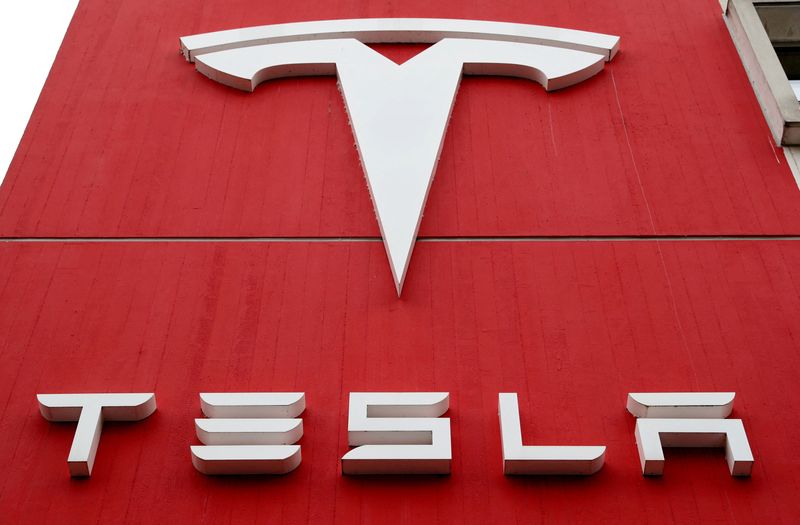By Daniel Wiessner
(Reuters) - A federal jury on Monday ordered Tesla (NASDAQ:TSLA) Inc to pay about $3.2 million to a Black former factory worker who won a lawsuit accusing the electric car maker of tolerating severe racial harassment at its flagship Fremont, California, assembly plant. The case is one of several involving working conditions at Tesla and other companies run by billionaire Elon Musk. Here is a look at what is at stake.
WHAT DISCRIMINATION CLAIMS IS TESLA FACING?
The trial involved Owen Diaz, a former elevator operator at the Fremont plant who said he was subjected to harassment including racial slurs and racist caricatures. Diaz won a $137 million verdict at a previous trial in 2021, but a federal judge lowered the jury's award to $15 million while agreeing that Tesla was liable. Diaz opted for a new trial on damages, where a different jury on Monday awarded him $175,000 for emotional distress and $3 million in punitive damages.
Tesla faces similar but much broader claims of tolerating racist conduct in a proposed class action by Black workers and a separate lawsuit by a California civil rights agency. Individual workers have also hit the company with several race discrimination lawsuits, including one filed last week by the former general manager of a service center in Atlanta. Those cases are in early stages and will not go to trial soon. Tesla has denied wrongdoing and called the agency's lawsuit politically motivated.
CAN THE PLAINTIFF OR TESLA CHALLENGE THE JURY VERDICT?
Diaz's lawyers are likely to ask the judge presiding over the case to increase the award at least to the level of the $15 million he awarded last year. Diaz could also ask a San-Francisco-based federal appeals court to order the judge to reconsider, or to order a new trial. His lawyers could argue that the trial judge was wrong to deny their bid last week for a mistrial, in which they claimed Tesla's lawyers improperly questioned Diaz about alleged racist and sexual comments he made to coworkers. Tesla, meanwhile, could challenge the finding that it was liable to Diaz at all and seek to throw out the entire jury award. The company could also argue that the punitive damages award was excessive. The U.S. Supreme Court has said punitive damages should typically be capped at less than ten times the award for emotional distress and other injuries.
DOES TESLA FACE MORE BIAS CLAIMS THAN OTHER MAJOR AUTO MAKERS?
The handful of pending cases against Tesla is in line with what any large company can expect. What stands out is the consistency of the claims alleging rampant harassment of Black workers at Tesla's plant in Fremont. Lawsuits against most other companies come from individual plaintiffs making allegations that vary significantly. But all the cases against Tesla claim the company's small human resources team had inadequate staffing to deal with a stream of complaints from Black employees.
WHAT ABOUT OTHER EMPLOYMENT ISSUES?
Tesla is also fighting a spate of sexual harassment lawsuits by female workers at the Fremont plant and another factory near Los Angeles. A pair of other complaints filed with the U.S. Department of Labor last year accuse Tesla of wage theft and worker safety violations at its $1.1 billion truck factory in Austin, Texas. In another pending case, a former production manager claims he was fired for raising concerns about safety issues at the Fremont plant and a factory in Nevada.
Tesla is appealing a U.S. labor board's decision last August that said the company illegally barred workers at the Fremont plant several years ago from wearing shirts bearing union insignia. Last week, a federal appeals court upheld the board's separate decision that Musk violated labor law by tweeting that Tesla employees would lose stock options if they joined a union.
In separate cases pending at the labor board, former employees of Tesla and SpaceX, Musk's rocket company, claim they were fired for criticizing him and the companies' employment policies.
WHAT HAVE ELON MUSK AND TESLA SAID ABOUT THESE CLAIMS?
In a 2017 email to Tesla staff in response to lawsuits by Diaz and other Black workers, Musk stated that "part of not being a huge jerk is considering how someone might feel who is part of an historically less represented group." But he went on to say minorities should be "thick-skinned" and accept apologies from coworkers who insult them.

Tesla in court filings has said it does not tolerate discrimination, takes complaints by workers seriously and disciplines employees who violate anti-bias policies. The company also has said it regularly updates management and members of its board on initiatives meant to prevent discriminatory conduct, including in pay and promotions.
On Monday, Musk tweeted that "the verdict would've been zero" if the judge had allowed the company to introduce new evidence in the retrial. He added: "Jury did the best they could with the information they had. I respect the decision."